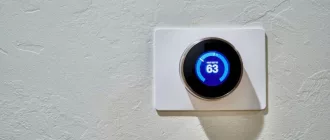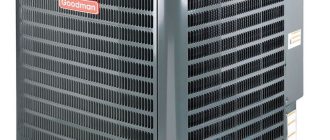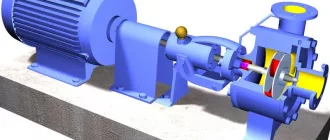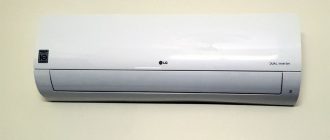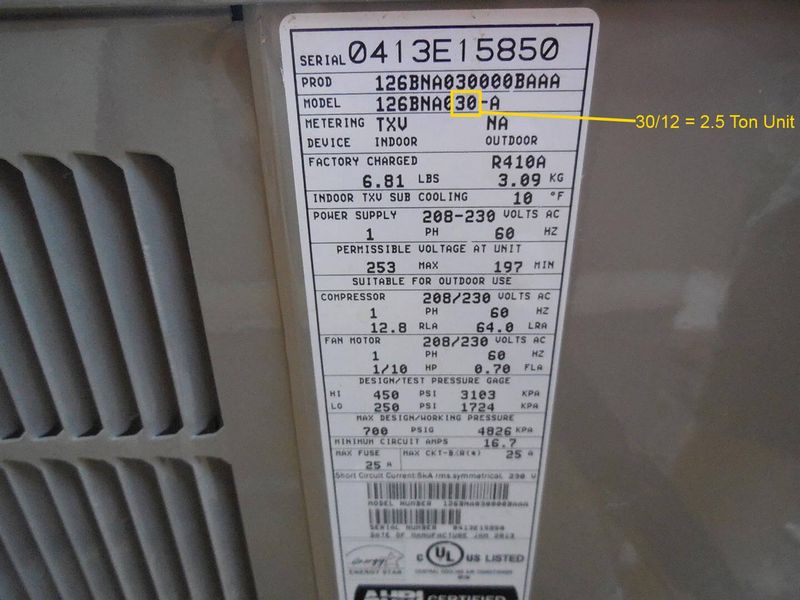
How old is my AC by serial number?
If you’ve ever wondered how old your air conditioner is, you may be surprised to learn that you can find out by looking at the serial number. The serial number is a unique identifier for your AC unit, and it contains valuable information about when it was manufactured.
So, how can you tell how old your AC is just by looking at the serial number? The first thing you need to do is locate the serial number on your unit. It is usually found on a metal plate or sticker somewhere on the outside of the unit. Once you have found the serial number, you can use it to decode the age of your AC.
Decoding the serial number may vary depending on the manufacturer, but there are some general rules to follow. Typically, the first two digits of the serial number represent the year of manufacture. For example, if the first two digits are “15”, your AC unit was manufactured in 2015. However, some manufacturers use different codes, so it’s important to consult the manufacturer’s documentation or website for specific instructions.
Knowing how old your air conditioner is can be helpful for a variety of reasons. It can help you determine if it’s time to replace your unit or if it’s still under warranty. Additionally, knowing the age of your AC can give you an idea of its expected lifespan, allowing you to plan for future repairs or replacements. So, take a few minutes to locate the serial number on your AC and find out just how old it is!
What is a Serial Number and Why is it Important?
A serial number is a unique sequence of numbers and/or letters that is assigned to a specific item, in this case, your air conditioner (AC). It serves as a way to identify and differentiate your AC from others. The serial number can usually be found on a metal or sticker plate on the exterior of your AC unit.
The importance of knowing your AC’s serial number lies in its ability to provide important information about your AC, including its age. By decoding the serial number, you can determine when your AC unit was manufactured, providing insight into how old it is. This information can be helpful in determining if it may be time for a replacement or if it is still within its expected lifespan.
The serial number can also be important when it comes to warranty or service inquiries. Manufacturers often use the serial number to track warranty coverage and service history. Knowing your AC’s serial number can streamline the process when contacting customer support or scheduling maintenance or repairs.
Understanding the importance of the serial number can help you make informed decisions about your AC and ensure that you receive accurate information and assistance when needed.
| – A serial number is a unique identifier assigned to your AC |
| – It helps determine the age of your AC |
| – It is important for warranty and service inquiries |
Locating the Serial Number on Your Air Conditioner
If you want to determine how old your air conditioner is, the first step is to locate the serial number on your AC unit. The serial number is a unique identifier that can provide valuable information about the age and manufacturing date of your air conditioner.
The serial number can usually be found on a metal plate or sticker located on the outside of your air conditioner. This plate or sticker is often located on the back, side, or bottom of the unit. The serial number is typically a combination of letters and numbers, and it may be labeled as “serial number,” “ser. no.,” or simply “S/N.”
Once you locate the serial number, you can determine the age of your air conditioner by using a serial number decoder or by contacting the manufacturer directly. These tools can provide you with detailed information about the manufacturing date, including the year and month your air conditioner was produced.
Knowing the age of your air conditioner is important for several reasons. An old air conditioner may be less efficient and more prone to breakdowns, while a newer unit may offer improved energy efficiency and be less likely to require repairs. Additionally, knowing the age of your air conditioner can help you anticipate when it may need to be replaced in the future.
By locating the serial number on your air conditioner and using it to determine the age of your unit, you can make informed decisions about its maintenance and potential replacement.
Decoding the Serial Number
The serial number of your AC unit is a unique identifier that can provide valuable information about its age and manufacturing details. By understanding how to decode the serial number, you can determine various important details about your AC unit.
- Manufacturer Code: The first few characters of the serial number represent the manufacturer code. This code can help you identify the company that manufactured your AC unit.
- Date of Manufacture: The digits that follow the manufacturer code usually contain information about the date of manufacture. This may include the year, month, or week of production.
- Model Number: Some AC units have the model number incorporated within the serial number. This can provide specific details about the features and specifications of your unit.
By analyzing your serial number, you can determine how old your AC unit is and gather important information about its manufacturer and model. This knowledge can be helpful when it comes to maintenance, repairs, or replacement of your air conditioner.
Understanding Manufacturer Codes
When trying to determine the age of your air conditioner, it’s essential to understand the manufacturer codes found in the serial number. These codes can provide you with valuable information about how old your AC unit is.
Your air conditioner’s serial number typically contains a combination of letters and numbers. Manufacturers use specific codes within the serial number to indicate the age of the unit. By decoding these codes, you can determine the manufacturing date and age of your AC.
To understand the manufacturer codes, you need to look for specific patterns within the serial number. Some common patterns include:
Year and month codes: In some serial numbers, the first two digits represent the year and the following two digits indicate the month. For example, if your serial number starts with “18,” it means the unit was manufactured in 2018.
Letter codes: In other cases, manufacturers use letters to represent the year of production. Each letter corresponds to a specific year, with the cycle typically repeating every decade. For instance, “A” might represent 2000 or 2010, “B” for 2001 or 2011, and so on.
Sequential numbers: Some manufacturers use sequential numbers within the serial number to indicate the year of production. For example, a serial number that ends with “07” means the unit was manufactured in 2007.
It’s important to note that manufacturer codes can vary between different AC brands. Therefore, it’s recommended to refer to the specific manufacturer’s documentation or website for accurate information.
By understanding these manufacturer codes and decoding the serial number of your air conditioner, you can determine how old your AC unit is. This information can be useful when deciding whether to repair or replace your air conditioner.
Determining the Manufacturing Date
One way to determine the age of your air conditioner is by checking its serial number. The serial number contains information about the manufacturing date, which can help you determine how old your AC unit is.
To find the manufacturing date, locate the serial number on your AC unit. The serial number is typically located on a metal plate or sticker attached to the unit. It is usually a combination of letters and numbers.
Once you have found the serial number, look for the date code within it. The date code is usually a set of characters that represents the manufacturing date. It can be in the form of numbers, letters, or a combination of both.
The format of the date code may vary depending on the manufacturer, so refer to the manufacturer’s documentation or website for specific instructions on how to interpret it. Some manufacturers may use a specific pattern or code that indicates the year and month of manufacture, while others may provide a table or chart to help you decipher the date code.
If you are having trouble locating or interpreting the date code, you can also contact the manufacturer directly for assistance. Provide them with your AC unit’s serial number, and they should be able to help you determine the manufacturing date.
Using the Serial Number to Determine the Age
If you are wondering how old your AC unit is, you can easily find out by using the serial number. The serial number contains important information that can help you determine the age of your air conditioner. Here’s how you can do it:
First, locate the serial number on your AC unit. It is usually printed on a sticker or a metal plate attached to the unit. The serial number is a unique combination of letters and numbers that identifies your specific AC unit.
Once you have found the serial number, look for the manufacturing date code within it. The code could be a two-digit or a four-digit number embedded within the serial number. The first two digits or the first four digits of the serial number usually represent the week and year of manufacturing.
For example, if the serial number is ABC1234567, and the first two digits are 45, then your AC unit was manufactured in the 45th week of the year. Similarly, if the serial number is XYZ987654, and the first four digits are 2020, then your AC unit was manufactured in the year 2020.
By using the serial number to determine the age of your air conditioner, you can make more informed decisions about when to replace or service your AC unit. Knowing the age of your AC unit can also help you plan for any potential repairs or maintenance that may be required in the future.
Remember, the age of your air conditioner is just one factor to consider when evaluating its performance. If you notice any issues with your AC unit, such as reduced cooling efficiency or strange noises, it is always recommended to consult a professional HVAC technician for a thorough inspection and proper diagnosis.
Checking for Warranty Coverage
If you are unsure whether your air conditioner (AC) is still under warranty, you can check by using the serial number. The serial number of the AC can be found on the unit itself or on the original packaging.
To determine the warranty coverage of your AC, follow these steps:
- Locate the serial number: The serial number is usually a combination of letters and numbers. It is unique to your AC unit, allowing manufacturers to track its production and warranty.
- Check the manufacturer’s website: Visit the manufacturer’s website and look for a warranty lookup tool or a page dedicated to warranty information. Enter the serial number of your AC in the designated field to check its warranty coverage.
- Contact the manufacturer: If you are unable to find warranty information online, or if you have any questions or concerns, contact the manufacturer directly. They will be able to provide you with the most accurate and up-to-date information regarding your AC’s warranty.
It is important to remember that warranty coverage can vary depending on the manufacturer, the age of your AC, and other factors. Checking your warranty coverage is essential to ensure that any potential repairs or replacements are covered, saving you from unexpected expenses.
Importance of Knowing the Age of Your Air Conditioner
Knowing the age of your air conditioner is important for several reasons. By determining the age of your AC unit, you can evaluate its performance and potential issues. This information can be crucial when deciding whether to repair or replace your air conditioner.
One way to determine the age of your air conditioner is by checking the serial number. The serial number usually contains information about the manufacture date. By understanding how to decode the serial number, you can accurately determine the age of your AC unit.
Knowing the age of your air conditioner is also beneficial for maintenance purposes. Different AC units have different lifespans, and regular maintenance is necessary to extend the life of your unit. By knowing the age of your air conditioner, you can schedule regular maintenance and inspections accordingly.
Furthermore, the age of your air conditioner can affect its energy efficiency. Older units tend to be less energy-efficient compared to newer models. By knowing the age of your AC unit, you can assess its energy efficiency and determine whether upgrading to a more efficient model is a viable option.
In conclusion, knowing the age of your air conditioner is crucial for evaluating its performance, scheduling maintenance, and assessing energy efficiency. By understanding how to determine the age of your AC unit by the serial number, you can make informed decisions about maintenance and potential replacement.
Signs Your Air Conditioner May Be Aging
If you’re wondering how old your AC unit is and you don’t have the serial number, there are a few signs you can look out for to determine its age:
- 1. Increased Energy Consumption: As an air conditioner ages, it tends to become less efficient. If you’ve noticed a significant increase in your energy bills, it could be a sign that your AC unit is getting old.
- 2. More Frequent Repairs: Older air conditioners may require more frequent repairs as their parts wear out. If you find yourself calling a technician for repairs more often than before, it could be a sign that your AC unit is aging.
- 3. Uneven Cooling: Aging air conditioners may struggle to cool your home evenly. If you notice that some rooms are colder or warmer than others when your AC is running, it could be a sign that your unit is getting old.
- 4. Noisy Operation: As air conditioners age, their components can become worn and loose, leading to increased noise during operation. If you’ve noticed that your AC is making more noise than usual, it could be a sign that it’s reaching the end of its lifespan.
- 5. Freon Leaks: Older air conditioners may develop leaks in their refrigerant lines, leading to a decrease in cooling effectiveness. If you’ve had to recharge your AC unit with refrigerant more frequently, it could be a sign that it’s aging.
While these signs can indicate that your air conditioner is aging, the most accurate way to determine its age is still by referencing the serial number. If you’re unsure, it’s best to consult a professional technician to assess the condition of your AC unit.
Average Lifespan of Air Conditioners
The average lifespan of an air conditioner, or AC, can vary depending on a number of factors. These factors include the quality of the unit, how well it is maintained, the climate in which it operates, and how frequently it is used.
In general, a well-maintained AC can last anywhere from 10 to 20 years. However, it is important to keep in mind that this is just an average range, and some units can last longer or shorter periods of time.
To determine how old your AC is, you can look at the serial number. The serial number provides information about the manufacturing date of the unit. By understanding how to decode the serial number, you can determine the age of your AC.
Knowing the average lifespan of your AC can help you make informed decisions about maintenance and when to consider replacing it. Regular maintenance and timely repairs can extend the lifespan of your AC, while neglecting maintenance can shorten its lifespan.
It’s important to consult with a professional technician to assess the condition of your AC and provide recommendations based on its age and overall performance. Regular servicing and professional advice can help you maximize the lifespan of your AC and ensure it operates efficiently for years to come.
Factors that Affect the Lifespan
Several factors can affect the lifespan of your air conditioner, even if you know its age by the serial number. Understanding these factors can help you determine how old your AC unit may be and when you might need to replace it.
- Installation: The quality of installation plays a significant role in the lifespan of an air conditioner. Improper installation can lead to various issues, such as leaks, improper airflow, or system breakdowns, all of which can shorten the lifespan of your AC unit.
- Maintenance: Regular maintenance is essential for prolonging the life of your air conditioner. Neglecting routine maintenance tasks, such as cleaning or replacing air filters, can reduce efficiency and cause strain on the system, leading to premature wear and tear.
- Usage: How frequently and under what conditions you use your air conditioner can impact its lifespan. Running the AC unit continuously, especially at the highest settings or in extreme temperatures, can put excessive stress on the system, causing it to wear out faster.
- Climate: The climate in which you live can also affect the lifespan of your air conditioner. Extreme heat or humidity can cause the unit to work harder, leading to increased wear and tear. Likewise, harsh winters or freezing temperatures can also impact the performance and longevity of your AC system.
- Brand and Quality: The brand and quality of the air conditioner can have a significant impact on its lifespan. Well-known and reputable brands often manufacture systems with higher quality components and materials, leading to increased durability and longer lifespans.
By considering these factors in addition to determining your AC unit’s age by the serial number, you can gain a better understanding of its expected lifespan and plan for any necessary repairs or replacements.
Extending the Lifespan of Your Air Conditioner
To ensure that your air conditioner lasts for as long as possible, there are several steps you can take. Firstly, it’s important to regularly maintain and clean your AC unit. This includes cleaning or replacing the air filters, removing debris from the external unit, and ensuring that the ducts and vents are clear of obstructions.
Another important factor in extending the lifespan of your air conditioner is to provide it with regular professional maintenance. Hiring a qualified technician to inspect and service your AC system once a year can help identify and resolve any issues before they become major problems.
Additionally, it’s important to keep an eye on the age of your air conditioner. By checking the serial number, you can determine how old your AC unit is. Generally, air conditioners have an average lifespan of 10-15 years. If your unit is nearing this age range, it may be time to start considering a replacement in order to avoid unexpected breakdowns and inefficiencies.
In conclusion, taking proper care of your air conditioner and addressing any maintenance needs in a timely manner can greatly extend its lifespan. Regular cleaning, professional maintenance, and monitoring the age of your AC unit are all essential in ensuring that it continues to operate efficiently and effectively for many years to come.
Should You Replace an Aging Air Conditioner?
An air conditioner’s lifespan can vary depending on several factors, such as how well it has been maintained and the quality of its components. One way to determine the age of your air conditioner is by looking at its serial number. By decoding the serial number, you can find out the year your AC unit was manufactured.
However, the age of the air conditioner is not the only factor to consider when deciding whether to replace it. An old air conditioner may still be functioning, but it could be costing you more in terms of energy efficiency and repairs.
- If your air conditioner is more than 10 years old, it is likely not as energy efficient as newer models. Newer air conditioners are designed to meet higher energy efficiency standards, which can result in significant savings on your energy bills.
- An aging air conditioner may also require frequent repairs and maintenance. As the components of the AC unit deteriorate over time, it can lead to increased breakdowns and costly repairs. These repair costs can add up quickly, making it more cost-effective to replace the unit altogether.
- Another consideration is the availability of replacement parts. Older air conditioner models may have discontinued parts, which can make repairs more difficult and expensive. If you find yourself struggling to find replacement parts for your aging air conditioner, it may be a sign that it is time to replace it.
In conclusion, while a serial number can help determine the age of your air conditioner, it is important to consider other factors as well. If your AC unit is old, inefficient, requires frequent repairs, or has discontinued parts, it may be time to invest in a new, more energy-efficient air conditioner. Consulting with an HVAC professional can help you make an informed decision about whether to replace your aging air conditioner.
Tips for Choosing a New Air Conditioner
When it comes to choosing a new air conditioner, there are several factors to consider. The age and condition of your current AC is important, but it is not the only factor to consider. Here are some tips to help you make the best choice for your needs:
1. Determine the size: One of the most important factors in choosing a new air conditioner is getting the right size unit for your space. An AC that is too small will struggle to cool the area, while an AC that is too large will waste energy and may not adequately remove humidity.
2. Consider energy efficiency: Look for an AC that has a high SEER (Seasonal Energy Efficiency Ratio) rating. Higher SEER ratings indicate greater energy efficiency, which can save you money on your energy bills in the long run.
3. Research different types: There are various types of air conditioners available, including central air conditioners, ductless mini-split systems, and window units. Consider the pros and cons of each type to determine which one is best for your home and budget.
4. Look for quiet operation: If noise is a concern for you, look for an AC that has a low decibel rating. Some models are designed with noise-reducing features, allowing you to enjoy a cool and comfortable home without the constant hum of an overly loud AC.
5. Check for warranties: Look for an air conditioner that comes with a good warranty. This will give you peace of mind knowing that the manufacturer stands behind their product and will provide support in case of any issues.
6. Consider additional features: Depending on your needs, you may want to look for additional features such as programmable thermostats, remote controls, or air purifiers. These features can enhance your comfort and convenience.
By considering these tips, you can make an informed decision when it comes to choosing a new air conditioner. Remember to consult with a professional to ensure that you select the right unit for your specific needs and requirements.
Q&A:
How can I find the age of my air conditioner?
You can determine the age of your air conditioner by finding the serial number on the unit’s nameplate. The serial number typically includes the manufacturing date. You can then use this information to determine the age of your air conditioner.
Where can I find the nameplate on my air conditioner?
The nameplate can usually be found on the back or side of the air conditioner unit. It may be located on the outside or inside of the access panel. You may need to remove the access panel to see the nameplate.
What does the serial number on my air conditioner tell me?
The serial number on your air conditioner can provide you with information about the unit, including the age of the air conditioner. The serial number often includes the manufacturing date, which can be helpful in determining the age of the unit.
Can I determine the age of my air conditioner without the serial number?
No, it is difficult to determine the age of your air conditioner without the serial number. The serial number typically includes the manufacturing date, which is necessary to determine the age of the unit. If you don’t have the serial number, you may need to contact the manufacturer or a professional for assistance.
What should I do if I can’t find the serial number on my air conditioner?
If you can’t find the serial number on your air conditioner, you may need to contact the manufacturer or a professional for assistance. They may be able to help you locate the serial number or provide you with additional information about your air conditioner.



